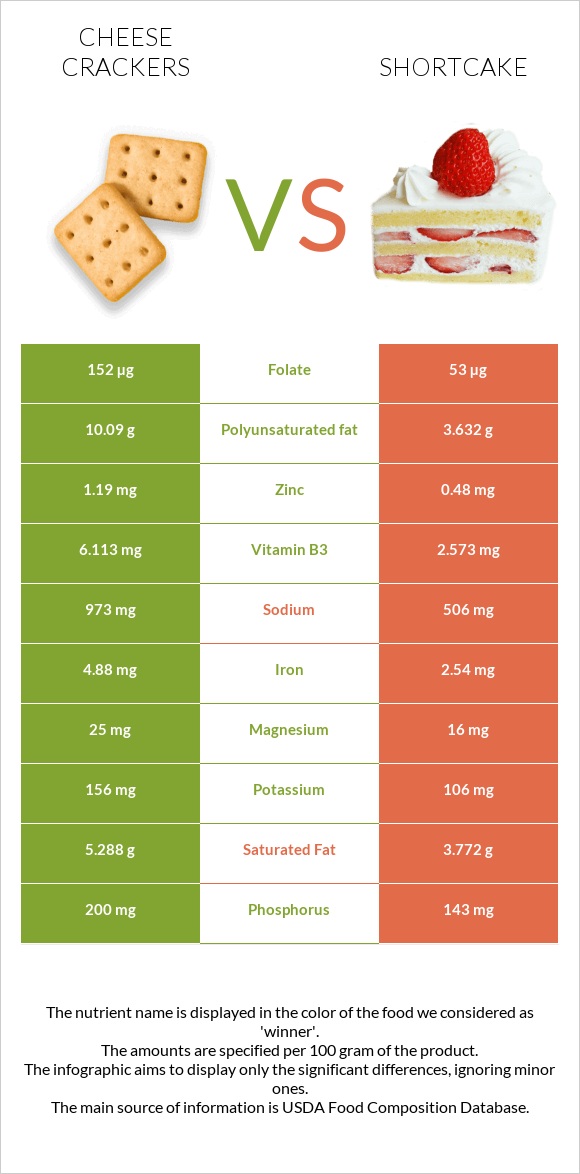Cheese crackers vs. Shortcake — In-Depth Nutrition Comparison
Compare
Significant differences between cheese crackers and shortcake
- The amount of iron, folate, vitamin B3, vitamin B1, vitamin B12, vitamin B6, manganese, and phosphorus in cheese crackers is higher than in shortcake.
- Cheese crackers cover your daily iron needs 29% more than shortcake.
- Shortcake has 6 times less vitamin B6 than cheese crackers. Cheese crackers have 0.17mg of vitamin B6, while shortcake has 0.03mg.
- Shortcake contains less sodium.
Specific food types used in this comparison are Crackers, cheese, regular and Cake, shortcake, biscuit-type, prepared from recipe.
Infographic

Infographic link
Mineral Comparison
Mineral comparison score is based on the number of minerals by which one or the other food is richer. The "coverage" charts below show how much of the daily needs can be covered by 300 grams of the food.
| Contains more MagnesiumMagnesium | +56.3% |
| Contains more PotassiumPotassium | +47.2% |
| Contains more IronIron | +92.1% |
| Contains more CopperCopper | +64.5% |
| Contains more ZincZinc | +147.9% |
| Contains more PhosphorusPhosphorus | +39.9% |
| Contains more ManganeseManganese | +70.3% |
| Contains more CalciumCalcium | +50.7% |
| Contains less SodiumSodium | -48% |
| Contains more SeleniumSelenium | +25.9% |
Vitamin Comparison
Vitamin comparison score is based on the number of vitamins by which one or the other food is richer. The "coverage" charts below show how much of the daily needs can be covered by 300 grams of the food.
| Contains more Vitamin EVitamin E | +∞% |
| Contains more Vitamin B1Vitamin B1 | +80.7% |
| Contains more Vitamin B2Vitamin B2 | +24.3% |
| Contains more Vitamin B3Vitamin B3 | +137.6% |
| Contains more Vitamin B5Vitamin B5 | +90.3% |
| Contains more Vitamin B6Vitamin B6 | +466.7% |
| Contains more Vitamin B12Vitamin B12 | +385.7% |
| Contains more Vitamin KVitamin K | +∞% |
| Contains more FolateFolate | +186.8% |
| Contains more Vitamin CVitamin C | +∞% |
All nutrients comparison - raw data values
| Nutrient |  |
 |
DV% diff. |
| Polyunsaturated fat | 10.09g | 3.632g | 43% |
| Iron | 4.88mg | 2.54mg | 29% |
| Folate | 152µg | 53µg | 25% |
| Starch | 52.56g | 22% | |
| Vitamin B3 | 6.113mg | 2.573mg | 22% |
| Vitamin B1 | 0.562mg | 0.311mg | 21% |
| Sodium | 973mg | 506mg | 20% |
| Vitamin E | 2.19mg | 15% | |
| Fats | 22.74g | 14.2g | 13% |
| Vitamin B6 | 0.17mg | 0.03mg | 11% |
| Vitamin B12 | 0.34µg | 0.07µg | 11% |
| Protein | 10.93g | 6.1g | 10% |
| Manganese | 0.562mg | 0.33mg | 10% |
| Fiber | 2.3g | 9% | |
| Phosphorus | 200mg | 143mg | 8% |
| Vitamin K | 9.4µg | 8% | |
| Calories | 489kcal | 346kcal | 7% |
| Calcium | 136mg | 205mg | 7% |
| Saturated fat | 5.288g | 3.772g | 7% |
| Zinc | 1.19mg | 0.48mg | 6% |
| Selenium | 13.5µg | 17µg | 6% |
| Copper | 0.125mg | 0.076mg | 5% |
| Vitamin B2 | 0.338mg | 0.272mg | 5% |
| Carbs | 59.42g | 48.5g | 4% |
| Vitamin B5 | 0.472mg | 0.248mg | 4% |
| Magnesium | 25mg | 16mg | 2% |
| Choline | 8.7mg | 2% | |
| Potassium | 156mg | 106mg | 1% |
| Monounsaturated fat | 5.744g | 6.045g | 1% |
| Vitamin C | 0mg | 0.2mg | 0% |
| Net carbs | 57.12g | 48.5g | N/A |
| Cholesterol | 3mg | 3mg | 0% |
| Vitamin D | 1 IU | 0% | |
| Sugar | 4.53g | N/A | |
| Vitamin A | 17µg | 18µg | 0% |
| Trans fat | 0.542g | N/A | |
| Tryptophan | 0.129mg | 0.076mg | 0% |
| Threonine | 0.295mg | 0.184mg | 0% |
| Isoleucine | 0.424mg | 0.238mg | 0% |
| Leucine | 0.744mg | 0.449mg | 0% |
| Lysine | 0.418mg | 0.197mg | 0% |
| Methionine | 0.194mg | 0.115mg | 0% |
| Phenylalanine | 0.49mg | 0.302mg | 0% |
| Valine | 0.478mg | 0.273mg | 0% |
| Histidine | 0.245mg | 0.14mg | 0% |
| Fructose | 0.37g | 0% | |
| Omega-3 - EPA | 0.001g | 0g | N/A |
| Omega-3 - ALA | 0.715g | N/A | |
| Omega-3 - DPA | 0.001g | 0g | N/A |
| Omega-6 - Dihomo-gamma-linoleic acid | 0.001g | N/A | |
| Omega-6 - Eicosadienoic acid | 0.007g | N/A | |
| Omega-6 - Linoleic acid | 9.25g | N/A |
Macronutrient Comparison
Macronutrient breakdown side-by-side comparison
Protein:
10.93 g
Fats:
22.74 g
Carbs:
59.42 g
Water:
3.55 g
Other:
3.36 g
Protein:
6.1 g
Fats:
14.2 g
Carbs:
48.5 g
Water:
28.4 g
Other:
2.8 g
| Contains more ProteinProtein | +79.2% |
| Contains more FatsFats | +60.1% |
| Contains more CarbsCarbs | +22.5% |
| Contains more OtherOther | +20% |
| Contains more WaterWater | +700% |
Fat Type Comparison
Fat type breakdown side-by-side comparison
Saturated fat:
Sat. Fat
5.288 g
Monounsaturated fat:
Mono. Fat
5.744 g
Polyunsaturated fat:
Poly. Fat
10.09 g
Saturated fat:
Sat. Fat
3.772 g
Monounsaturated fat:
Mono. Fat
6.045 g
Polyunsaturated fat:
Poly. Fat
3.632 g
| Contains more Poly. FatPolyunsaturated fat | +177.8% |
| Contains less Sat. FatSaturated fat | -28.7% |
~equal in
Monounsaturated fat
~6.045g





